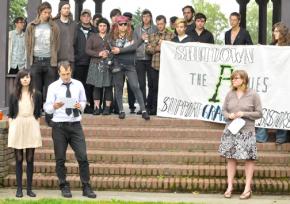FBI raids won’t silence us
reports from Seattle on the latest examples of the government's drive to demonize activists for exercising their right to protest.
THE NATIONAL security state began another offensive on political activists in late July as FBI agents raided homes in three cities along the Northwest coast, issuing federal grand jury subpoenas to at least six activists in Seattle, Portland, Ore., and Olympia, Wash. This comes after similar raids in Seattle in early July and earlier raids in Portland.
"There's a danger with grand juries looking into issues that involve people's political views," said Doug Honig of the Seattle chapter of the American Civil Liberties Union. "It can end up becoming a fishing expedition looking into people's political views and political associations."
Despite a search warrant for evidence linked to "destruction of federal property," the FBI seized common household items, such as black clothing, backpacks, shoes, paint, sticks, flags, flares, cell phones and computers. Agents also took "anti-government" and "anarchist" literature--such as notes, diagrams, letters, diary entries, journal entries, address books and other documents--in both written and electronic form. Activists suspect that the FBI is looking for "evidence" related to the recent May Day protests in the region.

Historically, as the Center for Constitutional Rights (CCR) has documented, the government has used both legal means (such as search warrants, grand jury subpoenas, indictments and trials) as well as illegal means (such as entrapment) to harass and destroy political opponents. In a country that loudly trumpets its respect for civil liberties, these raids are the latest example of the real risk activists face from the FBI, police and other law enforcement agencies, even as they engage in activity protected by the U.S. Constitution.
But the war began long ago, and it includes the crackdowns on past struggles like the labor, women's suffrage, antiwar and civil rights movements; the targeting of individuals and groups by the FBI's COINTELPRO program from the 1950s to 1970s; and the passage of the USA PATRIOT Act in 2001.
The Patriot Act contains the provisions criminalizing "material support" for "terrorism" that are today being used to target activists. As the CCR noted, "Such repression is never about the nature of the legal violations; it is always about discouraging vigorous dissent and protecting governmental and corporate interests."
ON THE day that activists were to testify before the grand jury, 120 demonstrators assembled in front of the U.S. District Courthouse in Seattle to stand in solidarity with the subpoenaed activists.
"I came here to support my Portland friends but also anyone who resists grand juries," said Locke, an activist from Portland. "Obviously, this is used as a tool for oppression and is a nationwide crackdown against anarchists in the wake of Occupy."
As two dozen Seattle police, U.S. Marshals and Homeland Security agents looked on from atop the courthouse steps, Leah-Lynn Plante, a subpoenaed activist from Portland, read a statement to the assembly:
We are releasing this statement to make clear our intention to resist the grand jury. We will not cooperate with their investigation. If we appear before the grand jury, we will not answer any questions other than our names. If we are asked additional questions, we will invoke our First, Fourth and Fifth Amendment rights. Under no circumstances will we talk about other people.
This grand jury is a tool of political repression. It is attempting to turn individuals against each other by coercing those subpoenaed to testify against their communities. The secret nature of grand jury proceedings creates mistrust and can undermine solidarity. And imprisoning us takes us from our loved ones and our responsibilities.
But our passion for freedom is stronger than the state's prisons. Our refusal to cooperate with the grand jury is a reflection of our own desires for a liberated world and our support for others who are working to bring that world into being. We support the efforts of all those who will be resisting this grand jury.
After a brief appearance before the grand jury at which she refused to give any information except her name, Plante received a new subpoena to appear on August 30 at 1 p.m., which coincides with the hearing of another subpoenaed activist, Dennison Williams, also from Portland.
It's essential for activists to stand up to the secrecy and intimidation of these raids and subpoenas with solidarity. Political, social and economic rights have only been won in this country when they were demanded in the streets. We should be alarmed--and turn this alarm into action.


